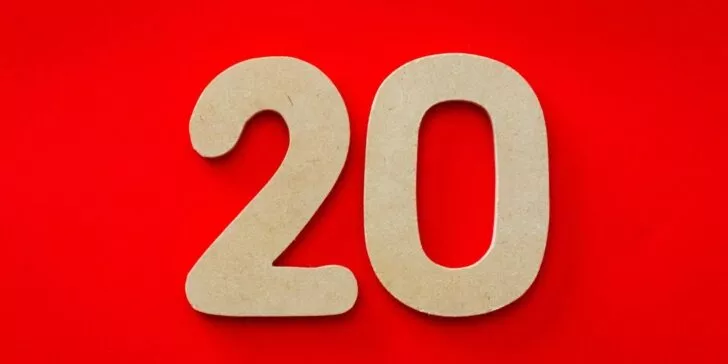
My first text of the morning wished me a happy International Punctuation Day. (What can I say? My friends know me.) But earlier this month Real Simple declared “The End of Punctuation?!?”
So which is it? Celebrated? Or on the decline?
…Both.
Digital communication – especially texting – is changing written communication.
The art of the run-on
Author Cormac McCarthy told Oprah, “If you write properly you shouldn’t have to punctuate.” In my opinion, Cormac McCarthy is a bit of an idiot.
Punctuation is a kindness. You’re helping your conversational partner understand you. Sometimes, yes, you’ll want to leave it out, but it’s a choice, not a default.
like if I’m really excited and I want you to feel how excited I am and how so much is going on I’ll leave out the punctuation because then it feels like I’m talking really fast you know???
But if I’m tired. If it’s been a long day. If I want you to feel how I’m plodding along. I’m not doing that.
An aside: voice texting throws assumptions awry. Voice-texting commands help, but homophone errors aside, and the cadence of speech is just different. It never comes out quite right.
Having the last word
In a piece in the New York Times last month called “A Millennial’s Guide to Kissing,” Emma Court has a beautiful commentary about relationship give-and-take. She’s not talking specifically about texting, but she could be. She says:
“Having the last word was once a sign of one’s wit and smarts. It meant that your comment had gravitas and staying power. But today, having the last word is the ultimate in weakness: It means being the person who doesn’t merit an answer.”
Ugh, yes. The pain of being the last to text. Nothing says “you don’t matter” quite as pithily, does it? Sometimes the conversation is obviously over – and the asynchronous nature of texting is understood. But when you offer a text and the conversation peters out – or never gets started at all – yeah, that’s not comfortable.
Spelling
Look, a geeky new linguistics term! “Affective lengthening” is something I learned from this article (if you like this stuff, read that whole piece). It’s when you repeat letters to make an emotional point.
Did you get it? — YASSSSSSSS
What do you think? — omg I can’t believe itttt
Double confession. First, I’m old enough that this usually irritates me. Second, I’m also immature enough that I’ve also caught myself doing it. It’s so hard to be me sometimes.
Emojis and GIFs
The problem with the written word is that it’s contextless. (But that may also be WHY I love it so – you have to be so careful with it.) Tone, expression, gesture – you don’t get any of them. Sarcasm is frequently the victim of texting’s context vacuum.
Enter emojis and GIFs. They’re imperfect and informal – but sometimes the subtleties of a picture of a face help make words clearer.
Not for serious things. Never for serious things. But for some things, they do the job. It’s still an awkward medium, though.
(Proof: I tried repeatedly to embed the Taylor Swift gif I use daily, but to no avail. Thanks, Taylor.)
And, finally: punctuation.
Did you know that using apostrophes means you’re good in bed? Sam Greenspan says so, anyway. The proof is unclear but I’ll go along with it.
There’s a fine line between “attention to detail” and “weird” though. Apostrophes? Good. A text that resembles an email? Strange.
And as the Real Simple article noticed – punctuation now has a lot more emotion tied to it. If you text a question and your friend replies with “Okay.” or “okay.” that’s a very different response than either “okay” or “okay!”
“[T]he humble period in a text ‘can be taken as the flat intonation of someone suppressing irritation,’ says Tyler Schnoebelen, Ph.D., the founder and chief analyst at Idibon, a language analytics company in San Francisco.”
(Tyler, I want to work for you.)
There’s also the new paradigm of punctuation inflation. (I made that term up but it sounds official.)
If you really want to know something, you don’t just ask with ? – you go for ??, or even ??? if you’re letting someone know you’re really animated. Multiple punctuation has an undertone of the casual (you wouldn’t do it in a business conversation) but also of connection (it implies you’re talking to a friend).
Then there’s punctuation elimination. Ending a text punctuation-less-ly is more like a pause for a response, rather than a statement of fact. It can be friendlier, pulling the conversation onward.
- let’s do it – invites a response.
- let’s do it. – is more serious.
- let’s do it! – is happier.
Does any of this actually matter?
All this might sound ridiculous. Who cares about a silly squiggle of punctuation?
Well, lots of people, really. It’s amazing how much is being analyzed and written about these phenomena. Just read this New Republic article about “the period’s outright hostility”.
It’s not really about the dots and dashes themselves. It’s about the people.
As a NYT interviewee said: “It’s interesting that everyone seems to have a different style they’ve adopted, and the quirks in their style you find yourself passing on to others. It’s as if mini texting accents are coming out.” I mirror the habits of the people I text – the way we capitalize, punctuate, line break, emoji – just as I mimic the formality and style of spoken language when I’m conversing. It’s basic biology; it’s how we connect.
If you curse, I’ll probably swear around you. If you talk faster or slower, I will too. And if you’re an emoji user, I’ll probably use them when we text.
It’s the heart of communicating. Am I getting through to you? Whether it’s facts, or who I am as a person…
I want you to understand me
I want you to understand me.
I want you to understand me!


